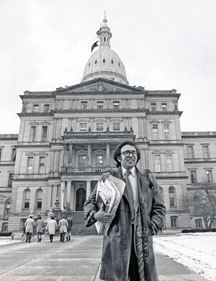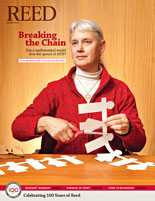
IRIS login | Reed College home Volume 91, No. 1: March 2012
In Memoriam
Howard Wolpe ’60
October 25, 2011, in Saugatuck, Michigan.

Howard Wolpe ’60 stands before the Michigan State Capitol with a sheaf of files and a hopeful smile. Kalamazoo Gazette, 1975.
Congressman, diplomat, professor, and author of a landmark piece of legislation that helped push South Africa to abandon apartheid, Howard combined a passion for justice and equality with a grasp of hardnosed politics.
“I used to insist that my greatest political strength was my fallibility,” Howard said in 2008. “I have always argued that when people can call you by your first name, that is a way of narrowing distance and improving communications. To hold onto power by putting yourself above the people is ultimately counterproductive.”
Howard’s mother was a clinical psychologist; his father, a pediatrician. He was 16 when he took the train from Los Angeles to Reed, drawn to the college for its brainy reputation. His freshman roommate was the future economist Lester Lave ’60. Howard treasured the sense of autonomy, the irreverence, and the testing of assumptions he found at Reed. “I think that my life and my career has always continued those characteristics that I loved so greatly, so deeply when I was here at Reed.” Howard served on the student senate, was a resident adviser, and fulfilled his P.E. credits through folk dancing and grueling basketball drills. He earned a BA in political science, studying with professors Maure Goldschmidt [political science 1935–81], Marvin Levich [philosophy 1953–94], and John Pock [sociology 1955–98]. “The work I did in sociology and political science helped inform my approach to politics and my understanding of politics.”
哈
Howard’s most significant accomplishment was the Comprehensive Anti-apartheid Act of 1986, which imposed sanctions against American companies doing business in South Africa—a turning point for the apartheid regime, or so it seemed until President Reagan vetoed the bill. Howard then led the effort to overturn Reagan’s veto. “The white minority regime will abandon apartheid, and will agree to enter into negotiations with the credible black leadership of the majority of the population, only at that point when it concludes that it has more to lose than to gain by attempting to hold on to apartheid,” he declared on the floor of the House. Congress ultimately overturned the veto by a thumping majority (313–83 in the House, 78–21 in the Senate). “That single legislative success made all the years I spent in Congress worth the effort,” he said.
The act stipulated that South Africa would have to release Nelson Mandela from prison before the sanctions could be lifted. When Mandela was finally released in 1990, one of the first things he did was to call Howard to thank him for his work.
杜
Tragedy struck in 2006, when he and his second wife, Judy, were caught in an undertow while swimming together on vacation in Guatemala. Howard made it to shore; Judy drowned.
在


LATEST COMMENTS
steve-jobs-1976 I knew Steve Jobs when he was on the second floor of Quincy. (Fall...
Utnapishtim - 2 weeks ago
Prof. Mason Drukman [political science 1964–70] This is gold, pure gold. God bless, Prof. Drukman.
puredog - 1 month ago
virginia-davis-1965 Such a good friend & compatriot in the day of Satyricon...
czarchasm - 4 months ago
John Peara Baba 1990 John died of a broken heart from losing his mom and then his...
kodachrome - 7 months ago
Carol Sawyer 1962 Who wrote this obit? I'm writing something about Carol Sawyer...
MsLaurie Pepper - 8 months ago
William W. Wissman MAT 1969 ...and THREE sisters. Sabra, the oldest, Mary, the middle, and...
riclf - 10 months ago